unit 3 topic 2 sectioa A
人教版九年级英语全册Unit3SectionA2a2d教学设计

学生收集并整理关于旅游的词汇和短语,包括本节课所学的词汇以及自己拓展的词汇。要求列出单词、音标、词性、中文释义,并尝试用这些词汇编写句子。5. Nhomakorabea究性学习:
学生以小组为单位,选择一个国内外著名的旅游景点,通过网络、书籍等途径收集相关信息,制作一份旅游宣传册。要求包含景点图片、简介、旅游攻略等内容,并用英语进行表述。
2.创设丰富的语言环境,通过图片、视频等多媒体资源,帮助学生更好地理解和记忆词汇和表达方式。
3.设计多样化的听说练习,如角色扮演、小组讨论等,提高学生的听说能力和实际运用能力。
4.针对语法难点,结合具体语境进行讲解和练习,帮助学生掌握语法规则和运用方法。
5.引导学生进行自主学习和合作学习,培养他们的独立思考和团队协作能力。
2.学生通过查阅资料、讨论等方式,收集有关景点的信息,如地理位置、历史背景、特色活动等。
3.各小组向全班展示和分享自己的成果,教师对每个小组的表现给予评价和鼓励。
(四)课堂练习
1.教师设计一系列与旅游相关的练习题,如填空、选择、匹配等,让学生巩固所学知识。
2.教师组织角色扮演活动,让学生模拟在景点咨询台和游客之间的对话,练习询问和回答有关旅游信息的问题。
2.树立正确的旅游观念,关注环保,养成良好的旅游行为习惯。
3.培养团队协作精神,学会与人沟通、交流,提高人际交往能力。
4.增强自信心,勇于表达自己的观点和看法,提高自我展示能力。
5.激发对英语学习的兴趣,树立学习英语的自信心,为实现终身学习奠定基础。
二、学情分析
针对九年级学生,他们在英语学习方面已具备一定的听说读写能力,但在本章节的学习中,仍存在以下特点与需求:
三、教学重难点和教学设想
2020年人教版英语九年级Unit3 第二课时 Section A 3a-4c 导学案设计(无答案)
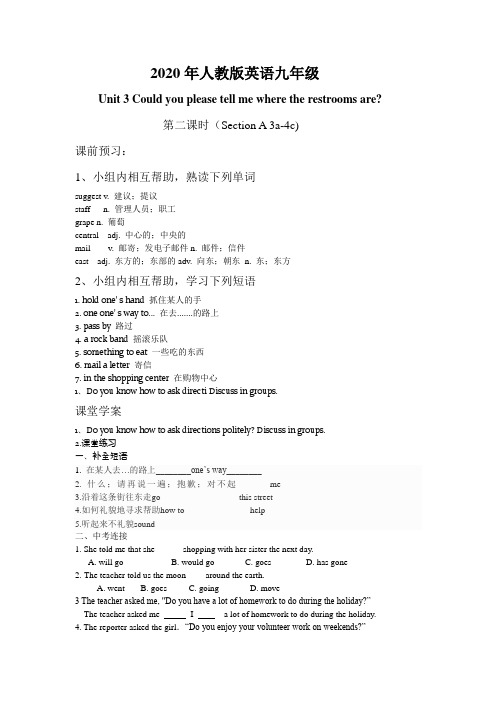
2020年人教版英语九年级Unit 3 Could you please tell me where the restrooms are?第二课时(Section A 3a-4c)课前预习:1、小组内相互帮助,熟读下列单词suggest v. 建议;提议staff n. 管理人员;职工grape n. 葡萄central adj. 中心的;中央的mail v. 邮寄;发电子邮件n. 邮件;信件east adj. 东方的;东部的adv. 向东;朝东n. 东;东方2、小组内相互帮助,学习下列短语1. hold one’ s hand 抓住某人的手2. one one’ s way to... 在去.......的路上3. pass by 路过4. a rock band 摇滚乐队5. something to eat 一些吃的东西6. mail a letter 寄信7. in the shopping center 在购物中心1、Do you know how to ask directi Discuss in groups.课堂学案1、Do you know how to ask directions politely? Discuss in groups.2.课堂练习一、补全短语1.在某人去…的路上________one’s way________2. 什么;请再说一遍;抱歉;对不起_______ me3.沿着这条街往东走go_______ _________this street4.如何礼貌地寻求帮助how to_______ ______help_________5.听起来不礼貌sound______________二、中考连接1. She told me that she______ shopping with her sister the next day.A. will goB. would goC. goesD. has gone2.The teacher told us the moon____ around the earth.A. wentB. goesC. goingD. move3 The teacher asked me, "Do you have a lot of homework to do during the holiday?” The teacher asked me I a lot of homework to do during the holiday.4. The reporter asked the girl.“Do you enjoy your volunteer work on weekends?”The reporter asked the girl she her volunteer work on weekends.5. My friend asked me, " Do you help your parents with the housework on weekdays?"My friend asked me I my parents with the house work on weekdays.6. “How do you look after your pet cat?” my teacher asked me.My teacher asked me ______ _____ ______ after my pet cat.7. “Are you going to watch the football match next Sunday?” Father asked me.Father asked me ______I _____ going to watch the football match next Sunday.8. "Did you sleep well last night?" David asked her.David asked her well last night.9.Please tell me. Who will give us a talk this afternoon?(合并为一句)Please tell me ________________ us a talk this afternoon.课后练习1.We __________ a visit to the museum the next day.2.You should never let an opportunity ______________.3.She and her __________ wrote that letter.4._________ government provides most funds.5.I watch _________ football a lot.6.She ________ to help her friend with English.二、单项选择()1.. I can't understand ______the boy alone.A. why she leftB. why did she leaveC. why she had leftD. why had she left.( )2.We are going for a picnic tomorrow. I'll call Wendy to make sure________.A.why to start B.when to start C.what to start D.which to start( )3. —Do you know sound travels very fast?—Yes. But light travels ________ sound.A.as fast as B.a little faster than C.much faster than D.slower than( )4.—Where are you going for the coming winter camp?—I won't decide on the place ________ the end of this month.A.until B.unless C.though D.through( )5. Traveling around big cities by taxi can cost a lot of money, but it's usually ________ to take the underground train to most places.A.amazing B.expensive C.convenient D.exciting ( )6. —Let's go shopping at the new mall. —Why not shop online? It's ________. A.expensive B.more expensive C.less expensive D.the most expensive ( )7.Could you tell me ________ the cool Tshirt?A.where you buy B.where do you buy C.where did you buy D.where you bought ( )8.— Do you know________?—Yes, I do. He went by skateboarding!A.whether Paul will go or not B.when will Paul go to the partyC.how Paul went to the party D.how did Paul go to the party( )9. The woman asked the policeman where ________.A.the post office is B.was the post office C.is the post office D.the post office was ( )10..—Do you know ________ the man with glasses is? —A reporter, I think.A.what B.that C.who D.where( )11..Could you tell me________?A.what to do it B.what to do C.how to do D.when to do( )12..—Could you please tell me ________?—Yes. There is one on Center Street. A.where can I buy some stamps B.when you will take your vacationC.when was the telephone invented D.if there are any good restaurants around here ( )13.The _____ in the shop are very helpful.A.staffB.staffsC.stafvesD.staffes( )14. If Nancy ________ the exam, she will go to Australia for English study.A.passB.passedC.passesD.will pass三、将下列简单句合并为复合句1.Where is my Chinese book? I don't know.I don't know ______ my Chinese book ____.2.She studies in Lantian Middle School. Jane says.Jane says ______ ________ in Lantian Middle School.3.Do you study French? Could you tell me?Could you tell me ____ ______ ________ French?4.Was he the first to come here? Please tell me.Please tell me ____ ____ ______ the first to come here.5.The earth goes around the sun. The teacher told the students.The teacher told the students ______ the earth ______ around the sun.四、完成句子:1.沿着这条路直走,然后左转。
Unit3Topic2SectionA教案九年级英语上册

Unit 3. Topic 2. Section ATeaching aims and demands:1.Learn the usage of showing the future by the present continuous tense .2. Know about the differences in speaking English among different Englishspeaking countriesTeaching key points:1.Key phrases2.The usage of showing the future by the present continuous tense. Teaching difficult points:The usage of showing the future by the present continuous tense. Teaching procedure:Step 1. Preview:1.Read the new words following the tape.2.Read 1a quickly, then finish 1b and 1c. Check the answers.3.Read 1a carefully, find out the key points.Step 2. Discussion1.Discuss the following phrases:1>. notice sb. do / doing sth.Notice + that clause2>. Help sb. do sth. / help sb. with sth.3>. calm v. 使平静adj. 平静的,沉着的(心情不激动)calm downquiet adj. 安静的,宁静的(指没有声音,不吵闹)silent adj. 寂静的,沉默的,不发音的(指不说话)4>. keep a secret./ It’s a secret.5>. have a victory.2 . Discuss 1a in groupsStep 3. Explain some difficult language points to students. Then finish 2a.Check the answers.Step 4. Do exercises(见课件)Finish 3. Check the answers.Step 5. Sum up this lesson, show homework.Written on the blackboard:Section A一. key phrases二. grammar课后反思:。
Unit 3 第2课时 Section A【阅读课】八年级英语下册(人教版)

2. My mom came over as soon as I sat down in front of the TV. The minute I sat down in front of the TV, my mom came over.
3. You’re tired, but I’m tired, too. Well, I work all day at school, too! I’m just as tired as you are!
do the dishes
fold the clothes
sweep the floor
finish doing sth.
make dinner
help out with
…
…
Prediction
Look at Nancy’s room, is it tidy?
Let’s find reasons together in the passage!
1.The general idea of the story
is about ___A_____.
A. the story of Nancy and her mother B. the story of Nancy and her dog C. The story of Nancy and housework
sad
3b Read the story again and the sentences below.
Write down the sentences from the reading that mean the same thing.
1. Neither of us did any housework for a week. For one week, she did not do any housework and neither did I.
人教版七下英语Unit3 Period 2 Section A(Grammar Focus-3c)

15. Itisabouttwokilometersfrommyschooltothesports center. (对画线部分提问)
_____H__o_w_f_a_r_____isitfromyourschooltothesportsce nter?
四、短文填空 阅读下面短文, 按照句子结构的语法性和上下文连
8. 我们每天都看电视。 WewatchTV______e_v_e_r_y_d_a_y_______.
9. 做家庭作业通常花费我半个小时。
Itusually________mehalfanhour_____________ takesto
___myhomework. do
10. 他需要一个小时到学校。 Heneedsanhour_________t_o_g_e_t ___toschool.
7.
B
Ittakes________onehour________myhomeworkever
yday.
A. I; doB. me; todo
C. me; doingD. my; todo
【点拨】考查固定句式。It作形式主语,真正的主语 为动词不定式to do。It takes sb. some time to do sth. 某人花费一些时间做某事,这里的sb.用宾格形式。
人教版七年级下
Unit3Howdoyougettoschool?
Period2SectionA (GrammarFocus-3c)
先练后背
提示:点击 进入习题
答案呈现
1 far
6 takesthesubway
2 kilometer
7 livesin
3 car
8 everyday
Unit 3 Topic 2 section A 教案仁爱版九年级英语上册

Unit 3 English around the WorldTopic 2 Some things usually have different meanings in differentcultures.Section BⅠ. Teaching objectivesKnowledge objectives:(1)Help students to learn the key words and phrases in the lesson.(2)Help students to know about some body language in English- speaking countries.. Skill objectives:(1)Students can understand some common and basic body language.(2)Students can use body language properly in communication..(3)Students can express some differences and similarities of body language. Emotional objectives:Develop their habit of observation and train their response to some circumstances. Cultural Awareness:Help students to learn something about cross- culture.Ⅱ. The key points and difficult pointsKey points:(1)Words and expressions : bow, silence, praise, research, secret, puzzled, victory, typical, misunderstanding, as a sign of, do some research(2)Sentences: 1)We bow when we are saying hello as a sign of respect.2)We use body language to communicate how we feel, even if there is silence. Difficult points:How to help students use body language properly in communication.How to help students understand the differences of some body language.Ⅲ. Learning strategies(1)Learn to make use of body language to get a better communication..(2)Collect some gestures of body language in English- speaking countries..(3)Be active in class.Ⅳ. Teaching aidsBlackboard, multimedia, projector, and pictures.V. Teaching proceduresStage 1(10 minutes):Revision and Pre-listeningStep Teacher activity Student activity Designing purpose1.Dutyreport Invite some students to doduty report.Make comments on theirperformance. Then reviewsome key points in SASome students arerequired to do dutyreport, while otherswatch and review somekey points in SA.Review the keypoints in SA.2.Warm-up and new words (Class activity) Present some pictures toteach them new words. Askstudents to finish exercise 2aon page 66. Get them to befamiliar with some bodylanguageComplete the exerciseand learn some newwords. Imitate somebasic gestures.Get students tolearn new wordswith the help ofpictures.3.A guessing game(group competition and pair work) Ask students to take part in aguessing game to get thepoints.Work in pairs and playthe guessing game.Lead in the topic.Develop theircooperation, andreview some bodylanguage.Stage 2(8 minutes):While-ListeningStep Teacher activity Student activity Designingpurpose1.Extensive listening(Class activity) Present students with anexercise, and summarizesome gestures in 1a.Students finish the taskand get familiar withthese gestures.Get students tolearn somegestures in 1a.2.Intensivelistening(Classactivity) Present a pre-listening task:1b Listen to 1a and mark T(true) or F (False).Get familiar with theexercise and makepreparation for thelistening.Help students toget ready for thelistening with thehelp of thepre-listening task.Stage 3(15 minutes):SpeakingStep Teacher activity Student activity Designing purpose1Practice(Class activity) PracticeAsk students to follow thevideo to practice the dialoguesentence by sentence. Thenask them to practice in groupfreely for three minutes.Students practice thedialogue in group forthree minutes.Practice can helpstudents master1a better.VI. Blackboard designSome things usually have different meanings in different cultures.2Competition (Group work)Ask three groups to choose one tasks.( different points for different tasks) Students complete different tasks according to theirchoices.Develop their cooperation and creativity. 3. ChallengeAsk students to make up their own dialogues using body language. Choose two groups only.Students work in group for the challenge. Develop their cooperation and creative thinking.Stage 5(10 minutes): Post-listening and speaking StepTeacher activityStudent activity Designing purposeDiscussion and sharing (group work)Ask students to discuss the body language with the collected information for about three minutes. (They have previewed a micro lesson about body language) Point out body language is a part of culture. Then invite some of them to share their reports with the whole class.Discuss the topic in group. And some of them come front to share their report with the whole class.Develop their cooperation and ability to summarize.Stage 6(2 minutes): Summarizing and assigning homework StepTeacher activityStudent activityDesigning purpose1Summary (Class activity)Sum up the key points in this lesson, including:1) Words and phrases: 2) Useful sentences:3) The infinitive: to + v. :4) Know more about different cultures.5) Express ourselves by proper body language.Follow the teacher to review the key points and tasks in this lesson.Sum up the key points in this lesson.Section BWords and phrases: bow, secret, victory puzzledas a sign ofdo some research Sentences:I wonder if body language means the same thing.I think that is known as body language.。
仁爱九年级上册Unit3Topic2SectionA优秀教学案例
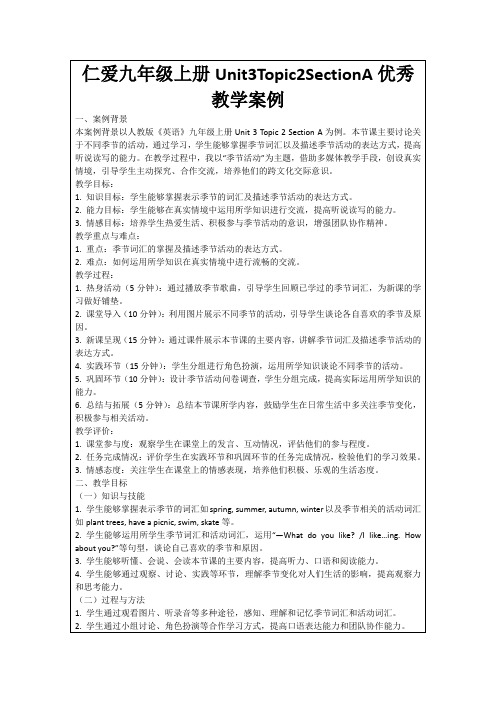
1.教师将学生分成小组,每组选择一个季节,讨论该季节的活动。
2.学生通过观察图片、思考、讨论等方式,选出自己小组喜欢的季节,并说明原因。
仁爱九年级上册Unit3Topic2SectionA优秀教学案例
一、案例背景
本案例背景以人教版《英语》九年级上册Unit 3 Topic 2 Section A为例。本节课主要讨论关于不同季节的活动,通过学习,学生能够掌握季节词汇以及描述季节活动的表达方式,提高听说读写的能力。在教学过程中,我以“季节活动”为主题,借助多媒体教学手段,创设真实情境,引导学生主动探究、合作交流,培养他们的跨文化交际意识。
教学过程:
1.热身活动(5分钟):通过播放季节歌曲,引导学生回顾已学过的季节词汇,为新课的学习做好铺垫。
2.课堂导入(10分钟):利用图片展示不同季节的活动,引导学生谈论各自喜欢的季节及原因。
3.新课呈现(15分钟):通过课件展示本节课的主要内容,讲解季节词汇及描述季节活动的表达方式。
4.实践环节(15分钟):学生分组进行角色扮演,运用所学知识谈论不同季节的活动。
4.鼓励学生互相评价、互相学习,提高合作学习的效果。
(四)反思与评价
1.教师引导学生回顾本节课的学习内容,总结季节词汇和活动词汇的用法。
2.学生通过自我评价、同伴评价等方式,反思自己在课堂上的表现,找出不足之处。
3.教师针对学生的学习情况,给予客观、公正的评价,鼓励优点,指出不足。
4.设计课后作业,让学生巩固所学知识,提高实际运用能力。
3.讲解如何用英语描述自己喜欢的季节和原因,如:“My favorite season is autumn because I like the beautiful colors of the leaves and the fresh air.”
人教新目标七年级英语下册 课时练习 Unit3 第二课时Section A(3a-3c) 含答案

课时训练Unit 3第二课时Section A (3a-3c)一、根据句意和汉语提示填单词。
1. My father goes to work at eight o’clock every(每)day.2. --Mike , can you ( 开车)?--No,I can't.3. How long does it take you (做)your homework?4. --Where does your uncle ( 居住)?--In Shanghai.5. My father always drives his _( 小汽车) to work.二、用所给词的适当形式填空。
1.- How long does it take you ( walk) to the train station?--About twenty minutes.2. - What about ( play ) basketball?-Good idea.3.It's about ten ( kilometer) from my home to school.4. Mike lives ( live) in Beijing with his parents.5.--Does he need about half an hour ( get)home after school?一Yes , he does.三、单项选择。
( ) 1. It's about walk from my home to school.A. ten minutesB. ten minuteC. ten minute'sD. ten minutes'( )2. - How does Mary get to school?一She gets to schoolA.by a busB.take a busC. takes a busD. by bus( )3.- Excuse me , Sir. is it from here tothe nearest shopping mall?- Well , only about five minutes ' walk.A. How oftenB. How longC. How farD. How soon( )4.-_ does it take you to go to the park by taxi? -- About 30 minutes.A. HowB. How farC. How longD. How many( )5.It will you about thirteen hours to flyto England from Hong Kong.A. spendB. takeC. useD. pay四、句型转换,每空-词。
Unit3Topic2SectionA学案初中英语九年级上册

Unit 3 Topic 2 Section A【学习目标】1.能用现在进行时表示将要发生的事情。
2.通过听说训练,能听懂有关搭便车的简单对话。
3.通过学习本课,培养乐于助人的品质。
【预习导学】一、生词速查1.n.陌生人→adj.奇怪的;陌生的2.conj.每当,无论何时3.v.上(船、火车、飞机等);住宿二、短语速记1.为某人送行2.在他们去机场的路上3.伸出他的手,大拇指朝上4.搭乘5.看他的手势语6.载我一程到机场去7.上车8.给他发一封邮件三、句子速译1.Michael sees a stranger putting out his hand with his thumb raised.______________________________________________________________ 2.Whenever you need help, send me an email or call me.______________________________________________________________ 3.Excuse me, could you please give me a ride to the airport?______________________________________________________________ 4.I hope I won't have much difficulty in munication.______________________________________________________________ 5.I can't believe that I'm flying to Disneyland.______________________________________________________________四、想一想1.“My uncle is meeting us tomorrow.”中为什么用现在进行时?______________________________________________________________ 2.“No need to worry.”的完整结构是什么?______________________________________________________________ 3.“What's up?”的同义句是什么?______________________________________________________________【答案】一、1.stranger strange2.whenever3.board二、1.see sb.off2.on their way to the airport3.put out his hand with his thumb raised4.ask for a ride5.look at his gesture6.give me a ride to the airport7.get on8.send him an email三、1.迈克尔看到一个陌生人正伸出一只手并竖着大拇指。
仁爱英语八年级上册第二单元第三话题sectionA

stomachache sore eyes
2a. Listen to the passage and circle the symptoms that you hear.
Common illnesses and Coronavirus What’s the matter?
2b. Listen to the passage and check (√) the advice you
Must we take some medicine to prevent the flu? 否定回答: No, we needn’t. / No, we don’t have to.
注:此处不能用 mustn’t (禁止;不准)回答
Make similar(相似的) conversations
Example:
have a tootcoronavirus
Nowadays, more and more people know the importance of keeping healthy.
What should we do to prevent the flu?
2.Read 1a together and find out Dr. Li’s advice.
First, _________w_e__sh__o_u_ld__e_x_e_r_c_is_e_o_f_t_e_n_t_o_b__u_il_d_u__s_u_p_._
Second, we should keep our rooms clean and __________th_e__a_i_r_fr_e_s_h__a_ll_t_h_e_t_i_m__e_. ____________
A: Must we exercise to prevent
仁爱九年级英语unit 3 topic2 课文翻译
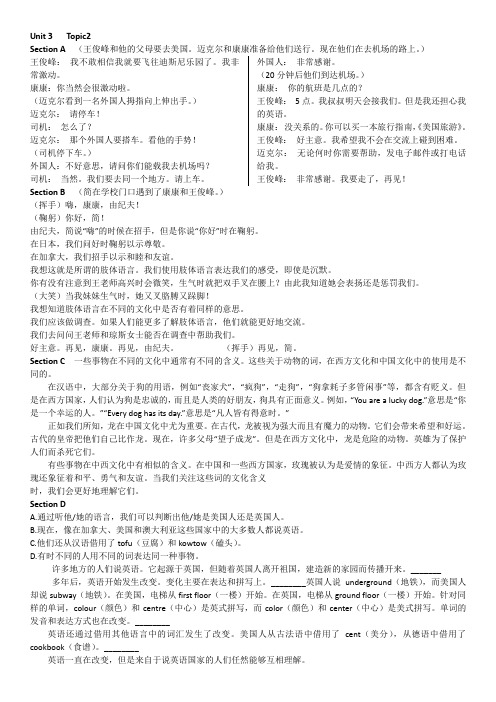
Unit 3 Topic2Section A(王俊峰和他的父母要去美国。
迈克尔和康康准备给他们送行。
现在他们在去机场的路上。
)王俊峰:我不敢相信我就要飞往迪斯尼乐园了。
我非常激动。
康康:你当然会很激动啦。
(迈克尔看到一名外国人拇指向上伸出手。
)迈克尔:请停车!司机:怎么了?迈克尔:那个外国人要搭车。
看他的手势!(司机停下车。
)外国人:不好意思,请问你们能载我去机场吗?司机:当然。
我们要去同一个地方。
请上车。
外国人:非常感谢。
(20分钟后他们到达机场。
)康康:你的航班是几点的?王俊峰:5点。
我叔叔明天会接我们。
但是我还担心我的英语。
康康:没关系的。
你可以买一本旅行指南,《美国旅游》。
王俊峰:好主意。
我希望我不会在交流上碰到困难。
迈克尔:无论何时你需要帮助,发电子邮件或打电话给我。
王俊峰:非常感谢。
我要走了,再见!Section B (简在学校门口遇到了康康和王俊峰。
)(挥手)嗨,康康,由纪夫!(鞠躬)你好,简!由纪夫,简说“嗨”的时候在招手,但是你说“你好”时在鞠躬。
在日本,我们问好时鞠躬以示尊敬。
在加拿大,我们招手以示和睦和友谊。
我想这就是所谓的肢体语言。
我们使用肢体语言表达我们的感受,即使是沉默。
你有没有注意到王老师高兴时会微笑,生气时就把双手叉在腰上?由此我知道她会表扬还是惩罚我们。
(大笑)当我妹妹生气时,她又叉胳膊又跺脚!我想知道肢体语言在不同的文化中是否有着同样的意思。
我们应该做调查。
如果人们能更多了解肢体语言,他们就能更好地交流。
我们去问问王老师和琼斯女士能否在调查中帮助我们。
好主意。
再见,康康。
再见,由纪夫。
(挥手)再见,简。
Section C 一些事物在不同的文化中通常有不同的含义。
这些关于动物的词,在西方文化和中国文化中的使用是不同的。
在汉语中,大部分关于狗的用语,例如“丧家犬”,“疯狗”,“走狗”,“狗拿耗子多管闲事”等,都含有贬义。
但是在西方国家,人们认为狗是忠诚的,而且是人类的好朋友,狗具有正面意义。
人教版英语九年级上册Unit3第2课时Section A 3a-4c优秀课件
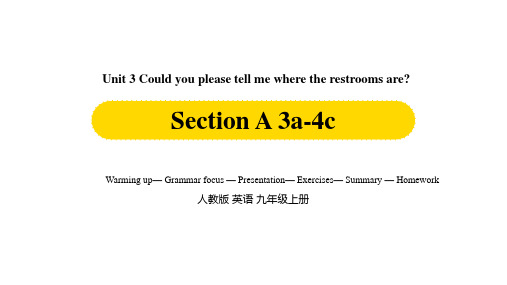
Excuse me, do you know where I can Sure. There’s a supermarket down the
buy some medicine?
street.
Could you please tell me how to get to Sorry, I’m not sure how to get there. the post office?
2. Excuse me, could you tell us when the band starts playing this evening? We’d like to know when the band starts playing this evening.
Grammar Focus
What’s the differences between the two columns?
4. What will they do after the ride? They will have dinner first.
Presentation
Language points
1. I suggest Water City Restaurant in Water 教材P19 3a)
从句要用虚拟语气,即谓语用“(should+)动词原形”。
讲解源于《教材帮》
Presentation
Language points
1. I suggest Water City Restaurant in Water World.(教材P19 3a)
Point suggest /səˈdʒest/ v.建议;提议
➢ I’d like to suggest another plan. ➢ My father suggested walking to the supermarket. ➢ She suggested our leaving right away. ➢ Our teacher suggested that we (should) go by train instead of by bus. suggest的名词形式是suggestion,为可数名词,意为“建议”,其同义词 advice为不可数名词。 ➢ I’d like to offer a suggestion.
仁爱版八年级英语上册Unit3Topic2Whatsweetmusic!优质教案A(2)
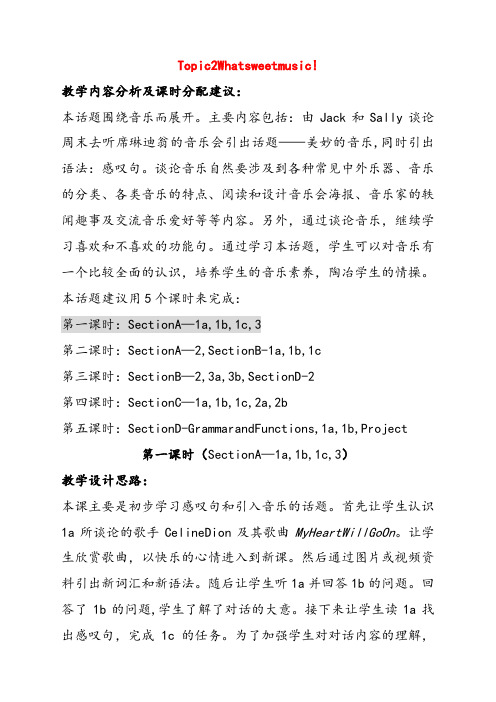
Topic2Whatsweetmusic!教学内容分析及课时分配建议:本话题围绕音乐而展开。
主要内容包括:由Jack和Sally谈论周末去听席琳迪翁的音乐会引出话题——美妙的音乐,同时引出语法:感叹句。
谈论音乐自然要涉及到各种常见中外乐器、音乐的分类、各类音乐的特点、阅读和设计音乐会海报、音乐家的轶闻趣事及交流音乐爱好等等内容。
另外,通过谈论音乐,继续学习喜欢和不喜欢的功能句。
通过学习本话题,学生可以对音乐有一个比较全面的认识,培养学生的音乐素养,陶冶学生的情操。
本话题建议用5个课时来完成:第一课时:SectionA—1a,1b,1c,3第二课时:SectionA—2,SectionB-1a,1b,1c第三课时:SectionB—2,3a,3b,SectionD-2第四课时:SectionC—1a,1b,1c,2a,2b第五课时:SectionD-GrammarandFunctions,1a,1b,Project第一课时(SectionA—1a,1b,1c,3)教学设计思路:本课主要是初步学习感叹句和引入音乐的话题。
首先让学生认识1a所谈论的歌手CelineDion及其歌曲MyHeartWillGoOn。
让学生欣赏歌曲,以快乐的心情进入到新课。
然后通过图片或视频资料引出新词汇和新语法。
随后让学生听1a并回答1b的问题。
回答了1b的问题,学生了解了对话的大意。
接下来让学生读1a找出感叹句,完成1c的任务。
为了加强学生对对话内容的理解,教师还布置了根据1b复述1a的活动。
只有让学生对1a的对话非常熟悉,才能顺利完成3的编对话任务。
3是学生在1a的基础上的升华,所以要作为重点活动。
教师鼓励学生展示3的成果,完成3。
最后师生一起回顾本课的语法和重点短语,完成本课时。
Ⅰ.Teachingaims1.Knowledgeaims:(1)学习并掌握新词汇concert,lend,singer,violin,drum,hiphop,(2)初步学习感叹句的构成。
- 1、下载文档前请自行甄别文档内容的完整性,平台不提供额外的编辑、内容补充、找答案等附加服务。
- 2、"仅部分预览"的文档,不可在线预览部分如存在完整性等问题,可反馈申请退款(可完整预览的文档不适用该条件!)。
- 3、如文档侵犯您的权益,请联系客服反馈,我们会尽快为您处理(人工客服工作时间:9:00-18:30)。
Act out the dialog.
Make new dialogs.
Singer Faye wong 《Eyes on me》 》 Place At the music hall Time At 7:00 p.m
guitar
piano
drums
violion
Guitar, piano , violin and drums are musical instruments.
What musical instruments are you interested in?
Can you play the …(play +the +乐器) 乐器) 乐器
2C work alone :Read and choose the correct answer
1D 2B 3D 4A
New words today
dance
swim
My heart will go on 我心永恒
Celine Dion 席琳 狄翁
Singer 歌手
beautiful , It sounds great
Can you lend it to me ? = May I borrow it from you?
lend 借 …… to
请找出对话中的感叹句
• • • • How exciting ! And it sounds great! Oh,wonderful! What a pity ! 感叹句的结构: 感叹句的结构: an) 形容词+名词+主语+ What +(a, an)+形容词+名词+主语+谓语 +形容词或副词 主语+ 形容词或副词+ How +形容词或副词+主语+谓语
concert 音乐会 pity 遗憾 hip hop violin 小提琴 musical 音乐的 artist 艺术家 pay 支付 go on 继续 lend 借出 singer 歌手 drum 鼓 instrument乐器 乐器 folk 民间的
教后反思: 教后反思:Fra bibliotekCheck the answers
1、She’s going to the concert 、 2、Celine Dion 、 3、At the Music Hall 、 4、At 7:30 p.m. 、 5、No, he isn’t. Because he is going 、 to take English lessons in Ren –ai English Training school.
Free talk about your hobbies with “I like-- best–” “ - - - is my favorite” “I love- - - ” “I am interested in- - -”
paint
sing
speak English
play basketball
Unit 3Topic 2
It sounds great
(Section A) 主备教师:灵宝市二中 杨定国
课前预习
预习内容: 预习内容:The main activities are 1a, 2a and 2b. 本 , 课重点活动是1a、2a和2b。 课重点活动是 、 和 。 预习检测: 、根据预习内容回答下列问题: 预习检测:1、根据预习内容回答下列问题: (1)What is Sally going to do this Sunday evening? ) (2)Who is going to sing at the concert? ) 3) (3)Where is she going to give the concert? (4)What time is it going to start? ) (5)Is Jack going to the concert ? Why? ) 2、写出下列短语: 、写出下列短语: (2)举办音乐会 (1)在音乐会上 ) 举办音乐会 !(4) (3)多么令人激动!( )上英语课 )多么令人激动!( (5)多么遗憾! (6)把一些音乐磁带借给你 )多么遗憾! )
……借给 把……借给 ……借入 把……借入
borrow 借 …… from
Listen and answer
• What is Sally going to do this Sunday evening? • Who is going to sing at the concert? • Where is she going to give the concert? • What time is it going to start? • Is Jack going to the concert? Why? ?
